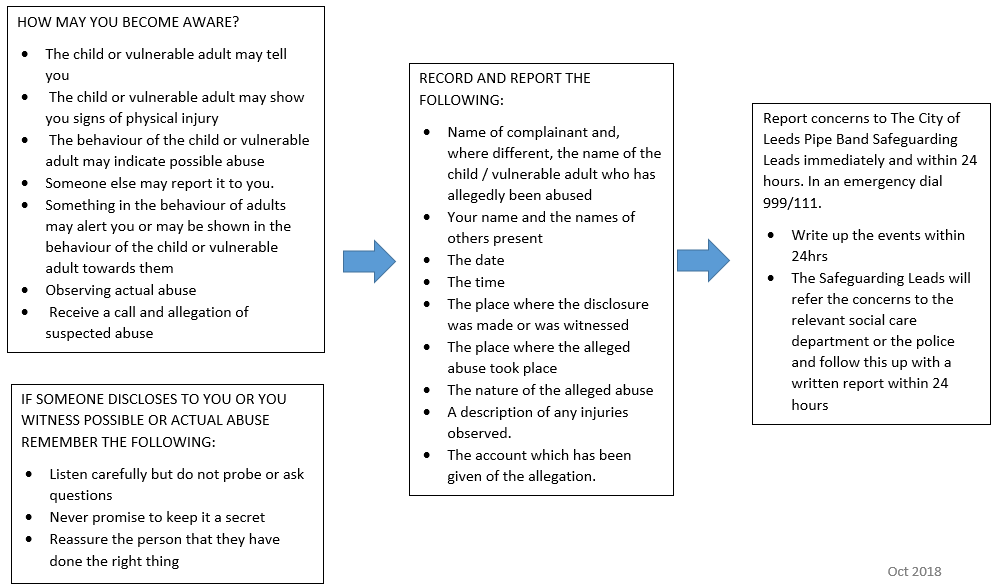Introduction
This policy applies to all members and non-members. The City of Leeds Pipe Band recognises the importance of its support services to families, children, young people and adults and its particular responsibilities to safeguard and promote the welfare of those who are vulnerable or at risk.
The welfare of a child or vulnerable adult is paramount whatever their age, culture, disability, gender, language, racial origin, religion or sexual identity and they have the right to be protected from abuse.
The City of Leeds Pipe Band recognises that some children, young people and vulnerable adults are additionally susceptible to abuse due to their disability, level of dependence, communication needs or other issues. The City of Leeds Pipe Band will always take extra care to look out for signs of abuse in this group of individuals and ensure that their needs are not neglected due to difficulties they may have in communicating signs of abuse.
All suspicions and allegations of abuse will be taken seriously and responded to immediately and the appropriate action taken.
THE PURPOSE OF THIS POLICY IS TO:
- Protect children, young people and vulnerable adults who receive support or access events run by or supported by The City of Leeds Pipe Band.
- Provide members and non-members with information on safeguarding in line with current legislation.
- Set out The City of Leeds Pipe Band’s responsibilities towards the safeguarding of children, young people and vulnerable adults.
LEGAL FRAMEWORK:
This policy has been drawn up using laws and guidance from the following:
Laws and guidance relating to children: The Children Act 1989 / The Children Act 2004, The Children and Families Act 2014, United Convention of the Rights of the Child 1991, Data Protection Act 2018, Equality Act 2010 Sexual Offences Act 2003, Protection of Freedom Act 2012, Working Together to Safeguard Children 2015.
Laws and guidance relating to vulnerable adults: Safeguarding Vulnerable Groups Act 2006, Protection of Freedoms Act 2012, Care Act 2014, Human Rights Act 1998, Equality Act 2010, Mental Capacity Act 2005, No Secrets January 2015, Safeguarding Adults; A national framework of standards for good practice and outcomes in adult protection work 2005.
DEFINITIONS:
A ‘Child or young person’ for the purpose of this statement refers to a person under the age of 18 years. This statement applies to all children and young people regardless of gender, ethnicity, disability, sexual orientation or religion.
A ‘Vulnerable Adult’ is defined as someone over the age of 18 years who receives a health, personal (includes personal care such as washing and dressing, toileting, feeding, financial matters) or social care service from a professional.
*Please note that in the case of someone who is 18 years or older, we do not have the right to report disclosures without their express permission unless that person is recognised as a vulnerable adult over 18 or there is a risk to someone under 18 years.
GOOD PRACTICE:
The City of Leeds Pipe Band has a ‘duty of care’ towards the people we work with to protect from harm. As part of its screening process, we ensure that Enhanced DBS Disclosures are obtained for members where appropriate. Where there has been a delay in receipt of a cleared disclosure The City of Leeds Pipe Band, where satisfied that the member is safe to practice and suitable references have been followed up, will allow the member to have contact with children, young people and vulnerable adults under supervision and on the proviso that they are not left alone with a child, young person or vulnerable adult.
The City of Leeds Pipe Band has a duty to report any member to the Independent Safeguarding Authority who has been removed from duty for allegedly causing harm or posing a risk of harm to a child or vulnerable adult.
THE MEASURES THE BANDS’ PUTS IN PLACE TO SUPPORT AND SAFEGUARD INDIVIDUALS:
- All members will have knowledge of child protection and safeguarding vulnerable adults and know what our policy and procedures are.
- Listen to, value, encourage and support those we work with.
- Ensure that all members are aware of our safeguarding procedures towards children, young people and vulnerable adults.
- Provide effective training and supervision for members and adopt safeguarding leads.
- Adopt a code of conduct for members.
- Include continuous risk assessment within our work with individual children, young people, vulnerable adults and their families.
- Recruit safely, ensuring all necessary checks are made including an enhanced disclosure and barring service checks.
- Work collaboratively with local authorities and professional bodies to ensure best practice in the interest of safeguarding children, young people and vulnerable adults.
- Where travel for an event is required, individual children, young people, vulnerable adults will arrange for travel with a responsible adult.
SAFEGUARDING LEADS:
Name of Safeguarding Lead: William MacDonald
Name of Deputy Safeguarding lead: Robert Procter
Telephone number: 07967 274552
Emergency Contact No: 07539 203897
Telephone number of Children’s Social Work Service (including out of hours number):
During Office hours (Monday to Friday, 8am to 6pm) – 0113 376 0336
Social Care – Emergency Duty Team (out of hours) – 0113 376 0469 and provide them with as much information as possible. You can also email on [email protected]To be appointed by committee members.
RECOGNISING THE SIGNS AND SYMPTOMS OF ABUSE:
Abuse may consist of a single act or repeated acts. It may be physical, verbal or psychological. It endangers and impairs someone’s physical and emotional health and development. It may be an act of neglect or an omission to act, or it may occur in the instance of a vulnerable person who is persuaded to enter into a financial or sexual transaction to which he or she has not consented, or cannot consent.
UNDERSTANDING AND RECOGNISING ABUSE:
Abuse may include but is not exclusive to the following:
- Physical abuse
- Neglect / Self-neglect
- Verbal abuse
- Psychological / Emotional abuse
- Sexual abuse (including sexual exploitation and female genital mutilation)
- Extremism and Radicalisation
- Domestic abuse
- Modern Day Slavery
- Mate crime and Hate crime
- Financial abuse
- Discriminatory abuse
- Organisational abuse
BECOMING AWARE OF A SAFEGUARDING ISSUE
*Please refer to the flowchart detailing how to report, record and respond to an allegation of abuse or suspected abuse.
The flowchart gives advice on how to respond to an allegation of abuse. It is important to be aware that the person first encountering a case of abuse or suspected abuse is not responsible for deciding whether or not abuse has taken place. This is the task for the professional child protection and safeguarding teams.
Confidentiality The legal principle that the “welfare of the child, young person or vulnerable adult is paramount” means that considerations of confidentiality which might apply to other situations in the organisation should not override the right of the individual to be protected from harm.
Any concern for the welfare of a child, young person or vulnerable adult must be reported immediately to one of the Safeguarding Leads and further action taken as required.
The City of Leeds Pipe Band will make sure that all records will be limited to those who require access or have a specific interest in the issue. Records will be stored securely and destroyed within a reasonable time frame unless there is a need to keep them.

